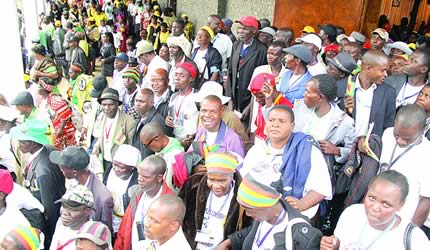Importance of an efficient society

 The Flip Side Kuthula Matshazi
The Flip Side Kuthula Matshazi
AS Zimbabwe attempts to recover and establish a prosperous and progressive economy that benefits its people, it will need to adopt such an approach, which is based on the concept of efficiency. According to Joseph Heath, in his book titled “The Efficient Society”, efficiency is a principle that allows people with different goals and aspirations to engage in mutually beneficial co-operation. Efficiency allows societies to operate at optimum producing mutually beneficial outcomes for the citizens and the country.
Two examples will contextualise the concept. The polarisation of Zimbabweans led to the MDC calling for the imposition of economic sanctions against the country as a political strategy to topple the Zanu-PF government. The MDC was determined to get into power by all means necessary, and it believed that if it destroyed the Zimbabwean economy, it would weaken the government leading to its collapse.
The second example relates to the recent exposure of corruption. Systemic corruption was exposed in State owned enterprise (SEOs), parastatals and local governments where senior managers earned obscene salaries and grossly flouted corporate governance principles. These two examples show people motivated by greed and selfish interests at the expense of the nation.
The intention of these actions was never to achieve mutually beneficial co-operation that would leave everybody better off. The economic sanctions plunged the country and its citizens into poverty, while white collar crime has deprived citizens of basic public goods such as access to healthcare, water and electricity.
A society becomes efficient if the condition of one person is improved without compromising that of another. If we allow and support the pursuit of our ideas and goals in common or individually, we all benefit. If the MDC pursued its political agenda in a deliberative fashion, it would still have managed to influence the national political process in a manner that would not have undermined the economic interests of the citizens and the country.
In fact, it would have earned the reputation of a responsible opposition, and based on that reputation, put itself in good stead to probably win the elections. Similarly, if the senior managers in the public service, for instance, the Premier Service Medical Association, had not spent a large proportion of revenue on compensation, the health of citizens would not have been compromised. Citizens would have been able to access healthcare, which is important for building strong and healthy communities, and a healthy national labour force.
An efficient society, according to Heath, is determined by the level of support each society provides to its members. The support does not necessarily have to come from the government, although it is a significant party to achieving efficiency.
Despite differences such as political beliefs, religion, gender, etc. there are activities that people can work together to achieve mutually beneficial selfish interests, which leave everyone in a better position. People can operate markets and businesses, in a transparent and responsible manner to create decent paying jobs that allow the expansion of the economy and enhance the standard of living or look after the disadvantaged and vulnerable who later turn to be friends, customers, and workers when they have been empowered.
The MDC would have managed to achieve a change in the political landscape without subjecting people to poverty and literally destroying the economy. Similarly, managers such as those from the Zimbabwe Broadcasting Corporation would have created a happy, productive workforce, affording a decent standard of living in the midst of economic sanctions. However, the managers chose obscene remuneration while failing to pay salaries of their workers for six months. ZBC managers undermined the principles of an efficient society.
A potentially lasting benefit of an efficient society is that it creates sustainable opportunities and positive relationships for a greater majority of people.
If we all work together, individually and in common, we succeed in providing opportunities for everyone, including the selfish. For instance, if ZBC operates as a profitable entity, then it pays its workers decent salaries, and promotes local artists while fulfilling its cultural, informational and entertainment mandate.
The corporation would create an ever-growing business model, which guarantees not only continued employment to the managers and staff, but potentially more opportunities that are not based on corruption. This applies to all other institutions which are part of our socio-economic system.
It is not easy to create an efficient society, but citizens and institutions such as government and the private sector can start by making small steps, reflecting on how their actions promote an efficient society.







Comments